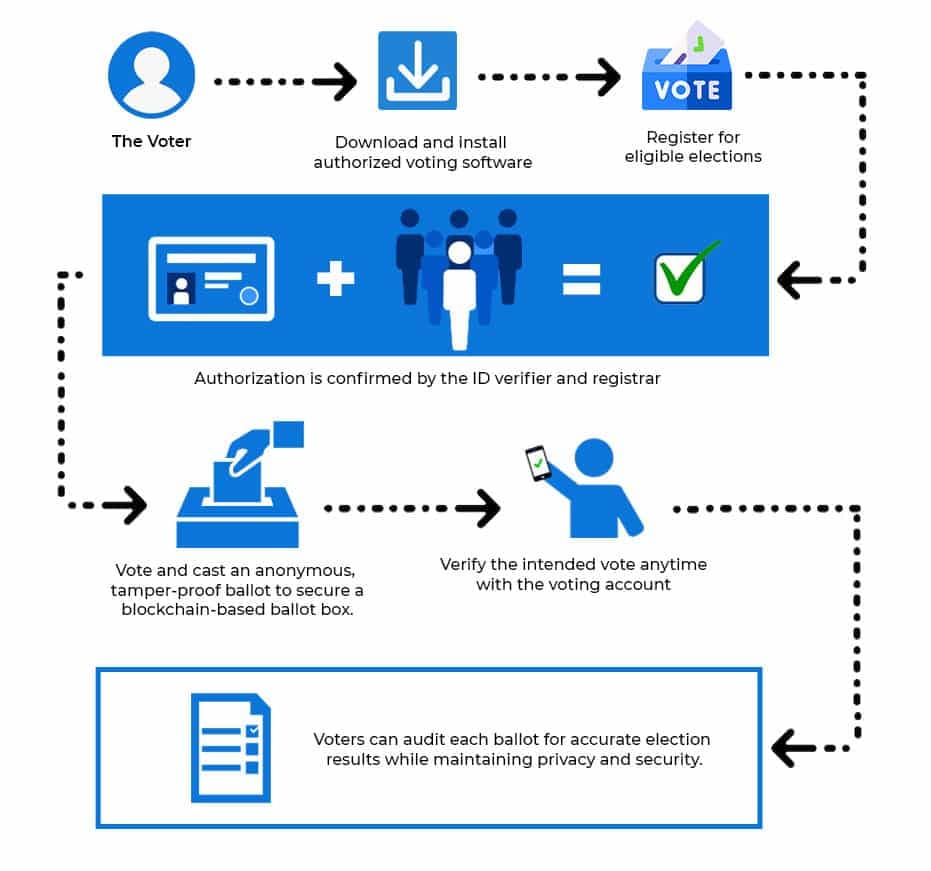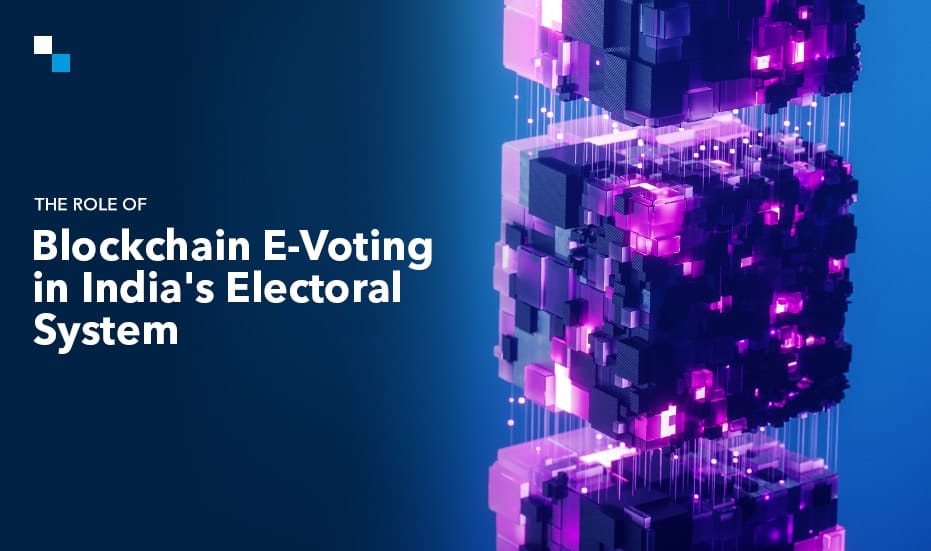A total of India 968.8 million Indian voters, the largest electorate in the world, are ready to vote in 1.05 million booths across the country to select their next government in the 2024 Indian election. The Election Commission of India appoints a host of officials on duty to ensure free and fair elections across the country. Besides all stringent arrangements by an independent regulatory body for polling in India, several questions are raised on electoral fraud due to the opaqueness within the voting process. Although EC assured in 2021 that EVMs (Electronic Voting Machines) cannot be tampered with by any Wi-Fi or other devices, the question of transparency and security persists.
To make voting more secure, transparent, and easier, several countries including the United States, Sierra Leone, Japan, and Russia have started using blockchain-based e-voting platforms. After witnessing the benefits of Blockchain development in electoral processes, India is also looking to test the system at some scale. Why? How can blockchain-based e-voting platforms be a saviour when it comes to facilitating free and fair elections in India?
Let’s learn how-
Key Challenges in India’s Electoral System
- Security Risks to Election Systems
The security of elections is important to maintain the sanctity of the democratic process. However, instances of violence, intimidation, and tampering are some challenges, especially in regions plagued by insurgency and political unrest, that need to be addressed. Additionally, the proliferation of fake news and misinformation further exacerbates these threats that influence voter sentiments and decision-making.
- Voter Registration Fraudulence
The integrity of voter registration forms the bedrock of a fair and inclusive electoral system. However, issues related to inaccurate voter lists, duplicate entries, and exclusion of eligible voters, particularly marginalized communities such as minorities and the economically disadvantaged, are a matter of concern. Administrative inefficiencies, bureaucratic hurdles, and partisan manipulation often undermine the credibility of voter registration processes.
- Poll Inaccessibility
Accessibility to polling stations is a fundamental aspect of electoral participation, yet it remains a significant challenge in India, especially in remote and rural areas. Inadequate infrastructure, logistical constraints, and geographical barriers hinder voters’ ability to cast their votes freely. Persons with disabilities face additional obstacles due to the lack of provisions for accessible voting facilities and assistance.
- Low Voter Turnout
Low voter turnout poses a significant challenge to the legitimacy and representativeness of elections. Despite the country’s vibrant democracy, a sizable portion of eligible voters abstain from participating in the electoral process due to various factors, including disillusionment with political institutions, apathy, and logistical constraints. This trend is particularly pronounced among urban youth and migrant populations.

Blockchain-based E-Voting Platforms- An Efficient Upgrade for Voting System
- Immutability and Transparency of Voting Records
The decentralized ledger and cryptographic principles of blockchain can ensure the immutability and transparency of voting records. Each vote cast on a blockchain-based e-voting platform is recorded as a tamper-proof transaction, making it virtually impossible for malicious actors to alter or manipulate the results. This not only safeguards the integrity of the electoral process but also fosters trust among voters, political parties, and electoral authorities.
- Decentralized Identity Verification Protocols
Blockchain-based e-voting platforms can address these challenges by providing a secure and transparent mechanism for voter registration and verification. Through decentralized identity verification protocols, voters can register securely on the blockchain, with their identities authenticated through biometric data or other secure means. This ensures that each voter is uniquely identified and eligible to participate in the electoral process, which further minimizes the risk of fraudulent registrations and enhances the integrity of voter rolls.
- Poll Accessibility
Blockchain-based e-voting platforms offer a promising solution to enhance poll accessibility and inclusivity. These platforms enable voters to cast their ballots securely from any location with internet access. Such platforms eliminate the need for physical presence at polling stations. This not only empowers voters with greater flexibility and convenience but also facilitates participation among marginalized and geographically isolated communities. Moreover, blockchain technology can ensure the anonymity and confidentiality of votes and address concerns related to coercion or intimidation at polling stations.
- Increased Voter Turnout and Engagement
Blockchain-based e-voting platforms have the potential to revitalize voter turnout by streamlining the voting process and leveraging digital channels for voter outreach and engagement. Such platforms have user-friendly interfaces and intuitive voting mechanisms that can make voting more accessible and convenient for citizens, especially the younger generation accustomed to digital technologies. Additionally, transparency and audibility associated with the practice of using blockchain for election voting instil confidence in the electoral process, motivating voters to participate and exercise their democratic rights.
How Blockchain-based E-Voting Platforms Work

Countries That Have Already Used Blockchain in Elections
The following are the countries that have already used blockchain for election voting. Take a look-
- Russia
Russia has created several state-funded blockchain-based voting systems, including Bitfury’s open-source platform Exonum. Although not all of them have been a success, Russia managed to become one of the countries that deployed blockchain in elections.
- Japan
Tsukuba City became the first Japanese City to introduce a digital platform based on blockchain for election voting, LayerX (a Japanese blockchain startup). This platform was used for social development proposals and to make Tsukuba a smart city in the country. This advancement in voting was a success as it has made voting easier and simpler for people through an application. Tsukuba has yet to use the system in the official government elections, however, the beginning of blockchain transformation can be observed.
- United States
The US used a blockchain-based for-profit electronic voting application called Voatz to vote in the 2020 Presidential election (Utah County) and the 2018 midterm election (West Virginia). Voatz application promises end-to-end encryption and provides total security for the networks.
- Sierra Leone
Sierra Leone used a for-profit blockchain voting application, Agora to store votes anonymously in an immutable ledger, that offers instant access to the election results. The goal of using blockchain technology in elections was to fight against corruption in the voting process and reduce voting costs by cutting out paper ballots.
Is India Heading Towards Blockchain-Based E-Voting?
India is one of the countries that is planning to employ blockchain-based e-voting at some scale in elections. In 2022, the students of Webops and Blockchain Club from CFI or Centre for Innovation conducted the student council election at the Indian Institute of Technology (IIT)-Madras using blockchain technology. This election was claimed to be the first of its kind to be used in the poll process. According to the officials, blockchain-based e-voting platforms offer a tamper-proof process that is verifiable and brings an innate trust in the election process.

Not only this, but the Election Commission of India is also collaborating with prestigious institutions like IIT Madras and CDAC (Centre for Development of Advanced Computing, India) to develop a more secure and efficient voting system for Indian voters. While India has yet to implement a blockchain-based e-voting platform nationwide, these small-level partnerships show the dawn of a major transformation in the future of India’s electoral process.
Apart from India, South Korea, and Thailand are two countries that are also planning to test the blockchain system at some scale.
Conclusion
Blockchain-based e-voting platform has the potential to revolutionize the electoral process in India. Such a platform offers the maximum level of transparency, security, and immutability that plays a crucial role in addressing many of the existing challenges plaguing traditional voting systems. Such blockchain-based platforms hold the promise of facilitating a fairer, more inclusive, and more efficient electoral process through their ability to ensure the integrity of votes, prevent tampering, and increase accessibility for voters.
Companies like Antier are working towards making the digital world, a decentralized world. Antier empowers governments to build more transparent and credible elections through preeminent blockchain development services and support. We have a trusted team to build the best blockchain-based e-voting platform, equipped with necessary features that ensure transparency and security in the electoral processes. Connect with our team and learn how we can help empower the future of Indian elections.





